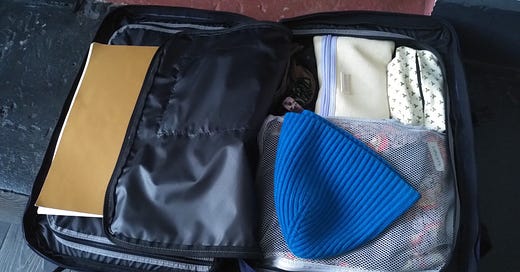That went well. I should be writing to you from the train but I am in my bed.
On Friday evening our Paris-Stuttgart train was cancelled due to SNCF strikes. With this, the whole journey has collapsed. We tried to salvage it but we were already on the first Eurostar out and going via Brussels was going to cost an extra £450. Day 1 was always high-risk: catching our first sleeper train (Stuttgart to Budapest) was crucial; when that became impossible then, suddenly, the dominos fell. You have to feel like the odds are on your side when you set out on a journey like that; it’s one thing for the plan to collapse when you’re en route, but beginning a four-day odyssey in fear and trepidation is going to ruin all the fun.
So, we’re flying out. I’m devastated. (The fury has passed.) It’s not a small thing to persuade a promoter that it’s reasonable to undertake such a journey (hmm); it’s not a small thing to invest all that time and money in researching and booking — and then rebooking1 and finally cancelling — such a journey; it’s not a small thing to have enticed a load of readers along for the ride! There’s love in it, and pride, and, above all, fantasy. I don’t want to presume, but my hunch is that a post reporting breathlessly on the Stansted Express, my choice of Pret sandwich and the leg room on an Airbus A321 NEO is not what any of us had in mind.
I mentioned Tim Ingold in my last post, and his distinction between the wayfarer and the transported traveller. For Ingold, the line of a wayfarer ‘goes along’, whereas the line of a traveller ‘goes across’, for transport is ‘destination-oriented’. ‘Indeed’, he writes, ‘the wayfarer or seafarer has no final destination, for wherever he is, and so long as life goes on, there is somewhere further he can go. For the transported traveller and his baggage, by contrast, every destination is a terminus, every port a point of re-entry into a world from which he has been temporarily exiled whilst in transit.’2
I’m not really wayfaring when I travel by train, of course, as the collapse of today’s journey shows: the network has broken; a spontaneous and improvisatory re-routing is impossible. And with a concert to perform at the other end, we have not the luxury of infinite time. To quote Ingold again: ‘But in practice transport is never perfect, just as it is impossible to be in several places at the same time. There is always some friction in the system. Thus unlike the wayfarer who moves with time, the transported traveller races against it, seeing in its passage not an organic potential for growth but the mechanical limitations of his equipment.’
I would have been racing, in some sense — that is part of the adventure — but the body is tracing an earth-bound line aboard a train, and the eye is wayfaring when it gazes out of the window, and the mind may find there is time for fantasy.
So, here I am in my bed, earth-bound, stationary and thinking about fantasy. The great adventure I had imagined has failed to get off the ground, and I find myself all packed up with nowhere to go! I shall fill the next two days with dutiful tasks (learning music and writing a funding application) and fantasy-fuelled research: we now get a bonus 36 hours in Istanbul and I’m going to wayfare the f**k out of that city.
Two weeks ago ÖBB brought forward the departure time of our Stuttgart-Budapest sleeper and I spent all afternoon rebooking trains to make that work. This is what I mean about the odds: they were stacking up against us!
All quotes taken from Tim Ingold’s Lines: A Brief History, particularly Chapter 3: Up, Across and Along.




Commiserations Ju!
Thank you for writing so eloquently about this huge frustration of a hard won and visionary plan. I love the rich distinction between wayfaring and transport. And I love you.
I’m so sorry your careful and joyful planning has been in vain, Juliet, and hope you will find lots to write about as you wayfarer your way around Istanbul. Better luck with your next train journey!